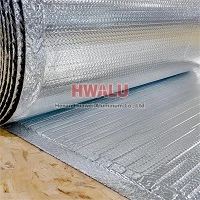Introduction of 8011 alloy aluminum foil 8011 alloy aluminum foil is added Al-Fe-Si elements, more than 1% of the total alloying elements in the corresponding performance of its alloy has a higher advantage, mainly for food packaging, and pharmaceutical packaging. Machinable range of thickness: 0.02mm-0.07mm, width 300mm-1100mm, can be customized according to customer needs. General parameters of aluminu ...
What is aluminum foil for pallets Aluminum tray foil is an aluminum foil material used to wrap and cover food trays. This aluminum foil usually has a larger area and a thinner thickness to fit the size and shape of the tray and can resist high temperature and humidity to protect food from contamination and damage. Aluminum foil for trays is widely used in the food service industry, especially in hotels, resta ...
Air conditioner aluminum foil Air-conditioning is indispensable to escape the heat in summer. As air-conditioning enters thousands of households, it is also constantly developing. At present, air conditioners are gradually developing in the direction of miniaturization, high efficiency, and long life. The air-conditioning heat exchange fins are also correspondingly developed in the direction of ultra-thin and hi ...
Can aluminum foil be used in food containers? Aluminum foil, as a metal material, is commonly used in the manufacture of food containers. Aluminum foil containers are a popular choice for packaging and storing all types of food due to their lightweight, corrosion resistance and thermal conductivity properties. Has many characteristics. 1. Aluminum foil container has corrosion resistance: the surface of alumin ...
What is aluminum foil for sealing Aluminum foil for sealing is a kind of aluminum foil used for sealing packaging. It is usually composed of aluminum foil and plastic film and other materials, and has good sealing performance and fresh-keeping performance. Aluminum foil for sealing is widely used in the packaging of food, medicine, cosmetics, medical equipment and other industries. Aluminum foil for sealing i ...
Aluminum foil rolling produces plastic deformation under the conditions of roll-free rolling. At this time, the rolling mill frame is elastically deformed and the rolls are elastically flattened. When the thickness of the rolled piece reaches a smaller and more limited thickness h. When the rolling pressure has no effect, it is very difficult to make the rolled piece thinner. Usually two pieces of aluminum foi ...
The post-processing of aluminum foil is an important part of an enterprise, which is related to the yield of an aluminum enterprise and the profit point of the enterprise. The higher the yield, the higher the profit point of the enterprise. Of course, the yield rate must be controlled in every link, standardized operation, and sophisticated equipment and responsible leaders and employees are required. I don't und ...
Is aluminum foil a good insulator? It is certain that aluminum foil itself is not a good insulator, because aluminum foil can conduct electricity. Aluminum foil has relatively poor insulation properties. Although aluminum foil has certain insulating properties in some cases, its insulating properties are not as good as other insulating materials. Because under normal circumstances, the surface of aluminum foi ...
Aluminum foil lunch box is not a new thing, but it is really the last two or three years is particularly active. In particular, the hot sealing aluminum foil lunch box, because it is the first sealed food and then high-temperature cooking disinfection, in the consumer to open the taste before the maximum ensure food safety and health, full tightness, and high barrier can also be a good lock food flavor. Even i ...
Aluminum foil pinhole has two main factors, one is the material, the other is the processing method. 1. Improper material and chemical composition will lead to a direct impact on the pinhole content of fake aluminum foil Fe and Si. Fe>2.5, Al and Fe intermetallic compounds tend to form coarse. Aluminum foil is prone to pinhole when calendering, Fe and Si will interact to form a firm compound. The number of ...
Material selection: The material of aluminum foil should be high-purity aluminum without impurities. Choosing good quality materials can guarantee the quality and service life of aluminum foil. Parent roll surface treatment: In the early stage of aluminum foil production, the surface of the parent roll needs to be cleaned and decontaminated to ensure a smooth and flat surface and avoid oxide layers and ble ...







